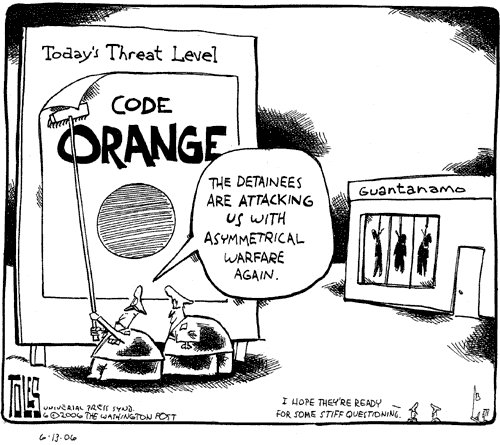Tuesday, June 13, 2006
Ted Rall: How Did You Vote on the War, Daddy?
How Did You Vote on the War, Daddy?
By Ted RallTue Jun 6, 8:06 PM ET
Pro-War Pols Don't Deserve a Political Future
DENVER--The congressmen and senators who lined up to cast their yeas and nays on October 11, 2002 knew that they were casting one of the most, if not the most, important votes of their political careers. Public Law 107-243, 116 Stat. 1497-1502, the result of the vote to authorize the Bush Administration to attack Iraq, would have incalculable moral, economic and geopolitical implications for the long-term future of the United States. But not every congressman put the interests of his country ahead of his career prospects. With George W. Bush still riding high in the polls less than a year after 9/11, it took courage and foresight--the ability to see a future in which the public would sour on Bush and his wars--to defy him.
As is often the case during times of crisis, when history tests the mettle of men and women, courage and foresight were in short supply. Fewer than a third--156 out of 529--dared to vote no.
Four years later, the Iraq war resolution reads like a classic of embarrassingly brazen propaganda. It says that Iraq posed a "threat to the national security of the United States," something that anyone with access to a map knew couldn't possibly be true. (Iraq's longest-range missiles had a maximum range of 500 miles.) It includes the debunked statements that Iraq had "a significant chemical and biological weapons capability" and was "actively seeking a nuclear weapons capability" [presumably a reference to Bush's phony Niger yellowcake uranium claim].
It's obvious to the 59 percent of Americans who think the war was a mistake that the 296 representatives and 77 senators who voted for this ridiculous tripe showed a spectacular lack of good judgment. As a result, nearly 2500 American troops are dead. So are 200,000 Iraqis. Between 18,000 and 48,000 U.S. troops have been wounded. We have no idea how many Iraqis have been crippled--perhaps over one million. Nearly $300 billion--more than 100 times the total amount spent to protect American cities from another 9/11--has been wasted.
If Iraq were a stock, it would be Enron. Thousands killed and billions spent, but what return have we received on our investment? The contempt of the entire world, radicalizing Muslims, soaring debts and the disturbing confirmation that our troops include mass murderers as well as torturers and concentration camp guards. Iraqi resistance fighters, outgunned and outmanned, own the cities and roadways.
Are we losing? Only an optimist would say that. We lost before we started.
This mess was predictable. In fact, I predicted it. So did many others. Still, the 374 politicians who voted for the war can reasonably argue, this dismal outcome wasn't set in stone. Smarter execution of the war--emphasizing the security of Iraqi civilians over our own troops, staying away from charlatans like Ahmed Chalabi, protecting Iraq's Sunni minority--might have mitigated some of the chaos.
Only a total idiot, however, could have bought the most bald-faced lie in the 2002 war resolution: conflating Iraq with the 9/11 terrorists. Accusing Iraq of "continuing to aid and harboring terrorist organizations" like Al Qaeda, the resolution contains 19 variants of the word "terrorism" and 10 references to "September 11, 2001." But Iraq had nothing to do with 9/11. Iraq couldn't have been involved because Saddam was a socialist secularist whose Iraq encouraged women to work in top jobs, whereas Osama bin Laden's Al Qaeda are radical Islamists seeking to establish a medieval caliphate where the only good woman is veiled behind a burqa. Saddam and Al Qaeda were mortal enemies. Everyone knew that.
Now that the political winds have changed, our wormy "leaders" are backing away from having voted for the war in October 2002.
"If Congress had been asked [to authorize the war], based on what we know now, we never would have agreed," probable 2008 presidential candidate Hillary Clinton backtracked in a fundraising letter to Democrats. "Americans should argue about the war," now allows John McCain, a slimy Republican who argued on the senate floor in 2002 that "giving peace a chance only gives Saddam Hussein more time to prepare for war."
Hecklers are tormenting Clinton and McCain at campaign appearances with reminders of their pro-war votes. "I think I was wrong to vote for the war," admits John Edwards, who will probably watch '08 from the sidelines in preparation for a run in 2012 or 2016.
Second-tier Democratic hopeful Mark Warner, reflecting the militant moderation of state-controlled media, warns against speaking ill of the politically brain-dead: "I don't think any U.S. senator, regardless of party, if they had known there weren't WMD, that we were going to get selected leaks, I don't think they would have voted for it. Second-guessing people who made a valiant attempt at judgment is not where I am at."
It ought to be. It ought to be where we're all at. Our elected representatives are paid to make the right choices for our country and its future. They deserve to be held accountable when they fail to measure up. Especially when it's important. Especially when it's easy to make "a valiant attempt at judgment."
On October 11, 2002, 156 congressmen and senators stood up for decency and common sense. The others, who proved they were too stupid and short-sighted to do the right thing when it counted, should resign. They don't deserve our votes, much less a shot at the White House.
(Ted Rall is the editor of "Attitude 3: The New Subversive Online Cartoonists," a new anthology of webcartoons.)
